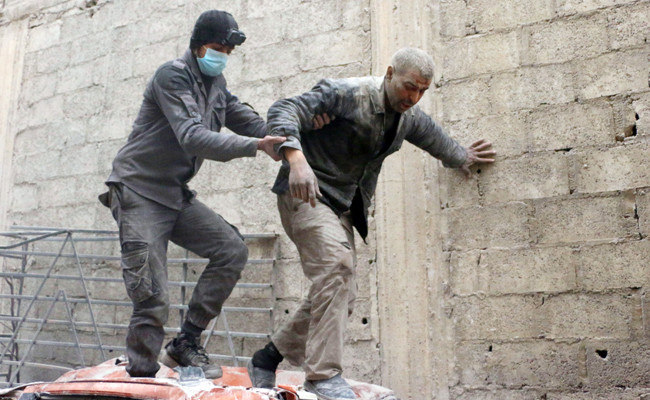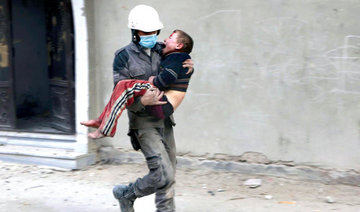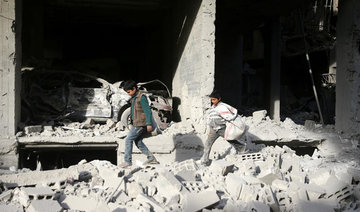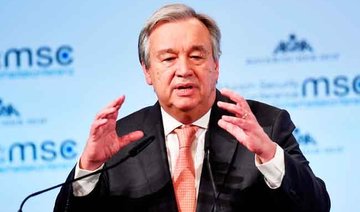JEDDAH: Saudi Arabia called on the Syrian regime to halt its bombardment of Eastern Ghouta where the death toll on Thursday passed 400 since the devastating assault began.
As international condemnation grew, aid agencies and doctors told Arab News of the dire conditions they are facing and pleaded for access to reach the injured.
But the outcry appeared to be falling on deaf ears as the regime rained rockets and bombs on the opposition-held territory on the edge of Damascus for the fourth consecutive straight day.
“We stress the need for the Syrian regime’s violence to end, and to have humanitarian aid and relief to enter Syria,” the Saudi Foreign Ministry said on Twitter.
“The political path to the crisis solution must be taken seriously, in accordance with the agreed principles of the Geneva Declaration 1 and the UN Security Council Resolution 2254.”
The UAE likewise “expressed its deep concern at the escalation of violence and its repercussions on the humanitarian situation and the safety of civilians.”
Warplanes pounded the last rebel enclave near the Syrian capital for a fifth straight day on Thursday, as the UN pleaded for a halt to one of the fiercest air assaults of the seven-year civil war.
The Syrian Observatory for Human Rights said Thursday night that the bombardment had killed 403 civilians, including 95 children.
Forty-six people were killed in strikes and rocket fire on Thursday and the bodies of victims killed earlier in the week were also retrieved from the wreckage of destroyed buildings.Human rights monitors and aid agencies said Russian and Syrian planes have struck hospitals and other civilian targets.
“This is really a systematic slaughtering of the Syrian people in front of the eyes of the international community,” Dr. Ghanem Tayara, chairman of the Union of Medical Care and Relief Organizations, told Arab News. “There’s no access at all, not even the birds can fly over Ghouta now.”
As the regime intensified its operations, residents huddled in basements as bombs flattened buildings, even hitting hospitals, AFP reported.
Medicins Sans Frontieres said 13 of the facilities it supports in Eastern Ghouta were damaged or destroyed in three days, leaving remaining staff with very little to save the hundreds of wounded brought to them every day.
In the hospital mortuary in Douma, the main town in the enclave where 400,000 people live, bodies wrapped in white shrouds were lined up on the floor, two of them children.
Residents of Douma described plumes of black smoke billowing from residential areas after planes dropped bombs from high altitude.
Searches were under way for bodies amid the rubble in the town of Saqba and elsewhere, said rescuers.
Syrian Army helicopters dropped fliers over Eastern Ghouta districts that included instructions for civilians wanting to leave the enclave safely, according to a media unit run by Assad’s Lebanese Hezbollah ally.
The fliers called on civilians to hand themselves over to the Syrian Army in order to save their own lives, with a passage highlighted on a map for a safe journey out of Eastern Ghouta.
Residents and opposition figures say the Syrian government and its allies are deliberately destroying infrastructure and paralyzing life in what they describe as a “scorched earth policy” to force rebels to surrender.
The Syrian army accuse the rebels of causing deaths by firing mortars on the heavily defended capital.
“They want to break our will and turn Ghouta into another Aleppo but this is their dream,” said Yusef Dughmi, a resident in the devastated eastern Ghouta town of Arbin overnight.
Many residents have been sheltering in basements.
“Why is the regime targeting us we are civilians and the regime and Russia are only targeting civilians?” Khaled Shadid, a resident of Douma told Reuters by telephone as sounds of explosions could be heard.
Basema Abdullah, a widow who was huddled in a basement with her four children in Douma said: “We are in desperate need for your prayers,” before the connection was cut off.
Rescue workers said at least 40 people were killed during Wednesday’s heavy bombing of Kafr Batna, Saqba, Zamalka and Arbin and other towns in the opposition enclave. In the town of Haza, the bombing targeted a field hospital and a bakery, rescuers said.
UN Syria envoy Staffan de Mistura said he hoped the Security Council would agree to a resolution calling for a ceasefire in eastern Ghouta, but warned it would not be easy.
President Bashar Assad’s main ally Russia, which wields a veto on the Security Council, said it could support a 30-day truce, but not one that included the militants it says the onslaught on Eastern Ghouta is meant to target.
The council was considering a resolution, drafted by Kuwait and Sweden, that demands “a cessation of hostilities throughout Syria for all military operations except those directed at Daesh ... Al-Qaeda and Al-Nusra Front” for 30 days to allow aid deliveries and medical evacuations.
Swedish UN Ambassador Olof Skoog said he hoped the council could vote on the resolution on Thursday. But Russian Ambassador Vassily Nebenzia said he would propose amendments to the text for “it to be realistic.”
Deputy US Ambassador to the UN Kelley Currie accused Russia of “appearing to be intent on blocking any meaningful effort” to halt the bloodshed in Eastern Ghouta.
“The United States is ready to vote on this resolution right here and right now. There is no reason to delay,” Currie told the council.
“What we need is a sustained cessation of hostilities and we need it desperately,” UN aid chief Mark Lowcock told the gathering. “Millions of battered and beleaguered children, women and men depend on meaningful action by this council.”
Saudi Arabia, UAE call on Syria to end Ghouta massacre
Saudi Arabia, UAE call on Syria to end Ghouta massacre

Israeli military says intercepted projectile that was launched from Yemen

- There were no immediate reports of casualties
CAIRO: The Israel military said in a statement early on Tuesday that sirens sounded in several areas in central Israel following the launch of a projectile from Yemen.
The missile was intercepted before crossing into Israeli territory, it added. There were no immediate reports of casualties.
The Iran-backed group in Yemen has repeatedly fired drones and missiles toward Israel in what it describes as acts of solidarity with Palestinians in Gaza..
Sudan drops out of hunger-monitor system on eve of famine report

- Sudan’s withdrawal from the IPC system could undermine humanitarian efforts to help millions of Sudanese suffering from extreme hunger, said the leader of a non-governmental organization operating there, speaking on condition of anonymity
KHARTOUM: The Sudanese government has suspended its participation in the global hunger-monitoring system on the eve of a report that’s expected to show famine spreading across the country, a step likely to undercut efforts to address one of the world’s largest hunger crises.
In a letter dated Dec. 23, the government’s agriculture minister said the government is halting its participation in the Integrated Food Security Phase Classification (IPC) system. The letter accused the IPC of “issuing unreliable reports that undermine Sudan’s sovereignty and dignity.”
On Tuesday, the IPC is expected to publish a report finding that famine has spread to five areas in Sudan and could expand to 10 by May, according to a briefing document seen by Reuters. “This marks an unprecedented deepening and widening of the food and nutrition crisis, driven by the devastating conflict and poor humanitarian access,” the document stated.
A spokesperson for the Rome-based IPC declined to comment.
Sudan’s withdrawal from the IPC system could undermine humanitarian efforts to help millions of Sudanese suffering from extreme hunger, said the leader of a non-governmental organization operating there, speaking on condition of anonymity.
“Withdrawal from the IPC system won’t change the reality of hunger on the ground,” the NGO source said. “But it does deprive the international community of its compass to navigate Sudan’s hunger crisis. Without independent analysis, we’re flying blind into this storm of food insecurity.”
A diplomat with Sudan’s mission to the United Nations in New York didn’t immediately respond to a request for comment on the move to cut off the IPC.
The IPC is an independent body funded by Western nations and overseen by 19 large humanitarian organizations and intergovernmental institutions. A linchpin in the world’s vast system for monitoring and alleviating hunger, it is designed to sound the alarm about developing food crises so organizations can respond and prevent famine and mass starvation.
IPC analysts typically partner with national governments to analyze data related to food insecurity and to report on conditions within a country’s borders. The government has headed the IPC’s analysis group in Sudan. But the system has increasingly struggled to function since civil war erupted in April 2023.
The fighting between the army-backed government and its foe, the Rapid Support Forces (RSF) paramilitary, has disrupted data collection in areas held by both sides.
A recent Reuters investigation found that the Sudanese government obstructed the IPC’s work earlier this year, delaying by months a famine determination for the sprawling Zamzam camp for internally displaced people where some have resorted to eating tree leaves to survive.
Monday’s letter was addressed to the IPC and it s Famine Review Committee, which vets and verifies a famine finding, as well as to diplomats. It says the forthcoming IPC report lacks updated malnutrition data and assessments of crop productivity during the recent summer rainy season.
The growing season was successful, the letter says.
It also notes “serious concerns” about the IPC’s ability to collect data from territories controlled by the RSF.
The IPC’s struggles go beyond Sudan. In a series of reports this year, Reuters has reported that authorities in Myanmar and Yemen have also tried to thwart the global hunger-monitoring process by blocking or falsifying the flow of data to the IPC or suppressing its findings.
In Myanmar, the IPC recently scrubbed from its website its assessment on hunger there, fearing for the safety of researchers. Reuters recently reported that representatives of the country’s ruling military junta have warned aid workers against releasing data and analysis showing that millions in Myanmar are experiencing serious hunger.
In Ethiopia, the government disliked an IPC finding in 2021 that 350,000 people were experiencing catastrophic acute food insecurity – so it stopped working with the IPC.
Alex de Waal, executive director of the World Peace Foundation at Tufts University’s Fletcher School, called Sudan’s move to stop cooperating with the IPC “both pathetic and tragic.”
“It’s part of a long history of the government of Sudan denying famine going back more than 40 years,” said de Waal, a leading specialist on famine. “Whenever there’s a famine in Sudan, they consider it an affront to their sovereignty, and they’re more concerned about their pride and their control than they are over the lives of their citizens.”
Iraq says to eliminate pollutant gas flaring by end of 2027

- The office of Iraqi Prime Minister Mohammed Shia Al-Sudani in a statement Monday evening pointed to “a rise in the level of eliminating gas flaring” in the country
BAGHDAD: Iraqi authorities on Monday announced that the energy-rich country would eliminate the polluting practice of gas flaring by the end of 2027, a statement from the prime minister’s office said.
Gas flaring during the production or processing of crude is intended to convert excess methane to carbon dioxide, but the process is often incomplete, resulting in further methane release.
Iraq has the third highest global rate of gas flaring, after Russia and Iran, having flared about 18 billion cubic meters of gas in 2023, according to the World Bank.
The office of Iraqi Prime Minister Mohammed Shia Al-Sudani in a statement Monday evening pointed to “a rise in the level of eliminating gas flaring” in the country.
The office said that the current rate of elimination stood at 67 percent, with the aim of raising that rate to 80 percent by the end of 2025.
It added that the country aims to fully eliminate gas flaring by the end of 2027, compared to the previous administration’s target of 2030.
In 2017, Iraq joined a World Bank-led initiative aiming to end gas flaring globally by 2030.
Gas flaring is cheaper than capturing the associated gas, processing and marketing it.
In an April report, Greenpeace Middle East and North Africa said gas flaring “produces a number of cancer-linked pollutants including benzene.”
Iraq is considered by the United Nations to be one of the five countries most vulnerable to some impacts of climate change.
In recent years, it has suffered increasingly from droughts and further desertification, with the country gripped by dust storms much of the year.
Defense minister acknowledges Israel killed Hamas leader in Iran

- The comments by Israel Katz appeared to mark the first time that Israel has admitted killing Ismail Haniyeh
- Katz said the Houthis leadership would meet a similar fate to that of Haniyeh
JERUSALEM: Israel’s defense minister has confirmed that Israel assassinated Hamas’ top leader last summer and is threatening to take similar action against the leadership of the Houthi group in Yemen.
The comments by Israel Katz appeared to mark the first time that Israel has admitted killing Ismail Haniyeh, who died in an explosion in Iran in July.
Israel was widely believed to be behind the blast, and leaders have previously hinted at its involvement.
In a speech Monday, Katz said the Houthis would meet a similar fate as the other members of an Iranian-led alliance in the region, including Haniyeh.
He also noted that Israel has killed other leaders of Hamas and Hezbollah, helped topple Syria’s Bashar Assad, and destroyed Iran’s anti-aircraft systems.
“We will strike (the Houthis’) strategic infrastructure and cut off the head of the leadership,” he said.
“Just like we did to Haniyeh, Sinwar, and Nasrallah in Tehran, Gaza, and Lebanon, we will do in Hodeida and Sanaa,” he said, referring to Hamas and Hezbollah leaders killed in previous Israeli attacks.
The Iranian-backed Houthis have launched scores of missiles and drones at Israel throughout the war, including a missile that landed in Tel Aviv on Saturday and wounded at least 16 people.
Israel has carried out three sets of airstrikes in Yemen during the war and vowed to step up the pressure on the militant group until the missile attacks stop.
New conflict in northeast Syria could bring ‘dramatic consequences’, UN envoy says

- Turkiye regards the YPG as an extension of the Kurdistan Workers Party (PKK) militants who have fought an insurgency against the Turkish state and are deemed terrorists by Ankara, Washington and the European Union
BEIRUT: Tensions in northeast Syria between Kurdish-led authorities and Turkish-backed groups should be resolved politically or risk “dramatic consequences” for all of Syria, the United Nations envoy for the country Geir Pedersen told Reuters on Monday. Hostilities have escalated between Syrian rebels backed by Ankara and the US-backed Syrian Democratic Forces in the northeast since Bashar Assad was toppled on Dec. 8.
Syrian armed groups seized the city of Manbij from the SDF on Dec. 9 and could be preparing to attack the key city of Kobani, or Ayn Al-Arab, on the northern border with Turkiye.
“If the situation in the northeast is not handled correctly, it could be a very bad omen for the whole of Syria,” Pedersen said by phone, adding that “if we fail here, it would have dramatic consequences when it comes to new displacement.” The SDF — which is spearheaded by the Kurdish YPG — has proposed to withdraw its forces from the area in exchange for a complete truce. But Turkiye’s Foreign Minister Hakan Fidan, speaking alongside Syria’s de facto new leader Ahmed Al-Sharaa on Sunday in Damascus, said the YPG should disband totally.
Turkiye regards the YPG as an extension of the Kurdistan Workers Party (PKK) militants who have fought an insurgency against the Turkish state and are deemed terrorists by Ankara, Washington and the European Union.
Pedersen said a political solution “would require serious, serious compromises” and should be part of the “transitional phase” led by Syria’s new authorities in Damascus. Fidan said he had discussed the YPG presence with the new Syrian administration and believed Damascus would take steps to ensure Syria’s territorial integrity and sovereignty. Turkish President Tayyip Erdogan said on Monday the country will remain in close dialogue with Sharaa. Kurdish groups have had autonomy across much of the northeast since Syria’s war began in 2011, but now fear it could be wiped out by the country’s new Islamist rule. Thousands of women rallied on Monday in a northeast city to condemn Turkiye and demand their rights be respected.
Pedersen said Sharaa had told him in meetings in Damascus last week that they were committed to “transitional arrangements that will be inclusive of all.”
But he said resolving tensions in the northeast would be a test for a new Syria after more than a half-century of Assad family rule.
“The whole question of creating a new, free Syria would be off to a very, extremely ... to put it diplomatically, difficult start,” he said.























